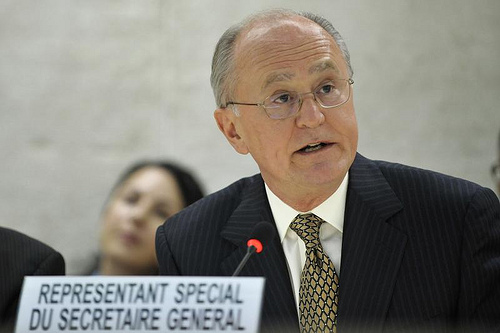
Behavioural guidelines for companies for approval to the UN Human Rights Council
John Ruggie, the special UN representative for human rights and business, presented the definitive Guiding Principles. Organisations such as SOMO can use these to hold businesses accountable when they disregard their human rights policy. There is a large basis of support for these guidelines among various stakeholders, but the principles are not enforceable. In June, the Human Rights Council of the United Nations is expected to approve the recommendations of Ruggie.
This approval would bring to an end a five-year mandate during which the UN representative worked on his Guiding Principles for the Protect, Respect and Remedy Framework. "Ruggie has initiated a debate on the role of business in respecting human rights, which has received broad-based support by governments, businesses, trade unions and social organisations," says SOMO researcher Mariëtte van Huijstee.
"The framework is not enforceable, unfortunately; both governments and businesses can evade the ambitions on which the framework rests," continues Van Huijstee. “That is the political and institutional reality which Ruggie has not tried to change; there is no single global entity to regulate the business community."
Complaints mechanisms
A great deal depends on the ambition which governments and businesses have to apply the Guiding Principles in day-to-day practice. If they act in the spirit of the guidelines, more effective complaints mechanisms can be realised for victims of human rights abuses, Van Huijstee expects. "Despite the ambitious nature of the principles, some of the guidelines are unfortunately open to interpretation. For example, it remains unclear in the case of principal 14 what exactly is the influence of the type of business operation (individual or group) on the responsibility of the corporation for human rights."
SOMO and the MVO Platform (which is coordinated by SOMO) have written substantive responses to the recommendations of Ruggie in recent years, on request. "SOMO has backed chain responsibility and transparency (principles 13, 17, 18 and 21), and is not alone in doing so." Although it has not been described as explicitly and clearly there as we had wanted." According to Van Huijstee, more explicit and indicative wordings have been incorporated in other places.
Involvement in human rights infringements
SOMO cannot avoid the conclusion that the corporate lobby has been successful. Contrary to the draft version, principles 23 and 24 have been added under ‘Issues of context’. “Principal 24 states that if a company is confronted with a necessity to take various actions to tackle the negative effects of its business operations, businesses must be able to prioritise," says Van Huijstee. “Imagine that a business gets involved in so many human rights infringements that it has to make a list of priorities… It would seem to me that we should always avoid such situations."
Dutch ‘state banks’
If the UN Human Rights Council approves the Guiding Principles in June, their application will be critical, according to the social organisations. “If the Netherlands implements the Guiding Principles, the banks supported by the government must carry out a thorough investigation into human rights, to provide investors with full disclosure in this area," argues Van Huijstee. "Social organisations have been calling for such investigations – which would have far-reaching consequences for the investments of a bank – for many years."
more on the Guiding Principles at Business & Human Rights Resource Centre >(opens in new window)
Related news
-
 CSDDD Datahub reveals law covers fewer than 3,400 EU-based corporate groupsPosted in category:News
CSDDD Datahub reveals law covers fewer than 3,400 EU-based corporate groupsPosted in category:News David Ollivier de LethPublished on:
David Ollivier de LethPublished on: -
 Additional evidence filed against Booking.com for profiting from illegal settlementsPosted in category:News
Additional evidence filed against Booking.com for profiting from illegal settlementsPosted in category:News Lydia de LeeuwPublished on:
Lydia de LeeuwPublished on: -
 The hidden human costs linked to global supply chains in ChinaPosted in category:News
The hidden human costs linked to global supply chains in ChinaPosted in category:News Joshua RosenzweigPublished on:
Joshua RosenzweigPublished on:

